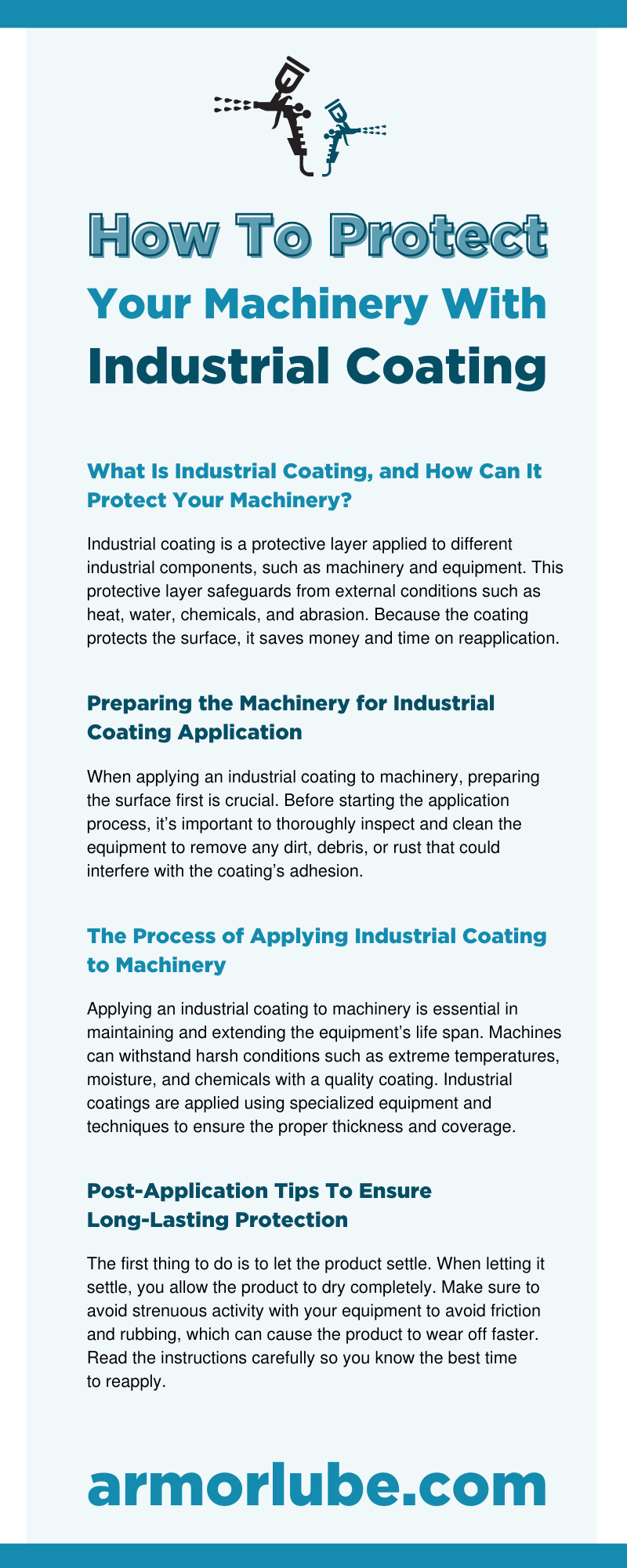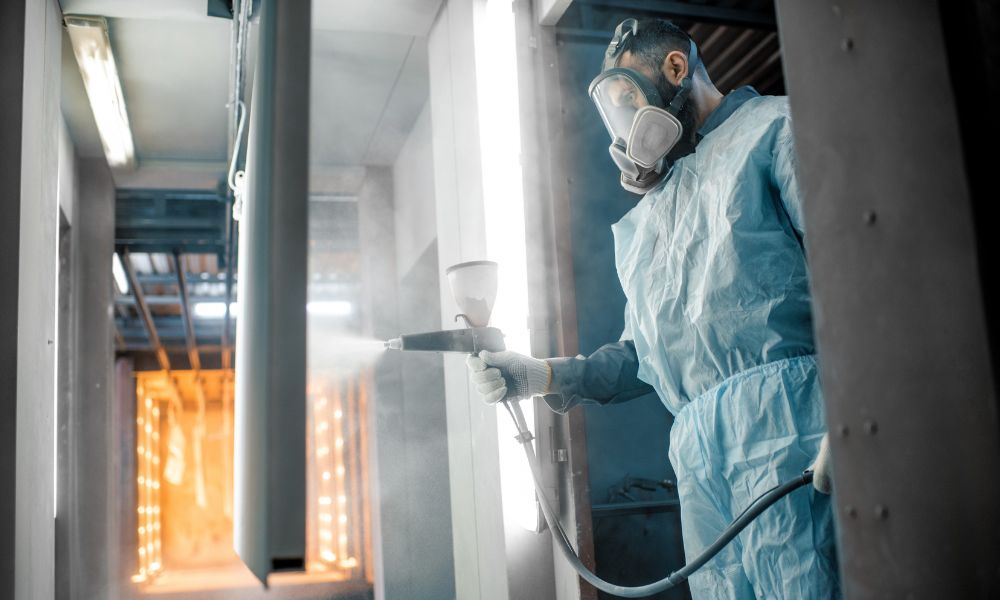Protecting your machinery from wear and tear is essential. Industrial coatings effectively reduce the cost of protecting your assets without negatively impacting performance. They protect components such as tanks, pipes, and structural steel and help increase sustainability by reducing water waste and energy consumption. In this blog post, we will discuss how you can utilize industrial coating solutions to extend the life expectancy of your equipment and optimize its performance.
What Is Industrial Coating, and How Can It Protect Your Machinery?
Industrial coating is a protective layer applied to different industrial components, such as machinery and equipment. This protective layer safeguards from external conditions such as heat, water, chemicals, and abrasion. Because the coating protects the surface, it saves money and time on reapplication.
The Benefits of Industrial Coatings for Machinery
Investing in industrial coatings is the best way to protect and improve equipment life span and durability. Applying an industrial coating to machinery makes it more resistant to wear and tear caused by friction, impact, and abrasion. By providing these protective benefits, industrial coatings lower the need for expensive repairs and replacements, resulting in significant cost savings over time. Let’s look at the benefits of industrial coatings for machinery.
Protection Against Wear and Tear
Industrial coatings protect machinery from wear and tear caused by friction, impact, and abrasion. They form a protective layer that prevents the equipment’s surface from deteriorating and extends its life span. Applying an industrial coating to machinery helps prevent costly repairs and replacements.
Resistance to Corrosion
Rusting machinery is a frequent problem, especially when exposed to harsh environmental conditions. Industrial coatings provide a barrier against corrosion and rust, preventing damage and extending the machinery’s life span.
Chemical Resistance
In some operations, machinery may encounter chemicals or corrosive substances. Industrial coatings can provide excellent chemical resistance, protecting machinery from these substances.
UV Protection
Machines exposed to the sun’s ultraviolet (UV) rays can experience fading, chalking, and deterioration. Industrial coatings can protect machinery from UV damage, preventing degradation and preserving the equipment’s appearance.
Types of Industrial Coatings and Their Benefits
Industrial coating is an essential aspect of many manufacturing processes. Choosing the correct type of industrial coating for your application is crucial to ensuring optimal performance and longevity for your finished product.
Several types of industrial coatings are available, each with unique features and benefits. Some popular options include epoxy coatings, polyurethane coatings, and acrylic coatings. These popular options have helped many industrial companies save money and improve their maintenance time.
One coating type is epoxy; this coating is durable, chemical-resistant, and ideal for harsh environments. Polyurethane coatings are flexible and abrasion-resistant, perfect for surfaces that withstand wear and tear. Acrylic coatings offer excellent color retention and UV resistance, making them ideal for outdoor applications.
Understanding the benefits of each industrial coating type can help you decide what coating meets your specific needs.
Preparing the Machinery for Industrial Coating Application
When applying an industrial coating to machinery, preparing the surface first is crucial. Before starting the application process, it’s important to thoroughly inspect and clean the equipment to remove any dirt, debris, or rust that could interfere with the coating’s adhesion. Cleaning the equipment may involve using high-pressure water or sandblasting techniques. Next, you must lubricate all moving parts and check for proper functioning. After applying the coating, ensure it’s dry and contaminant-free before operating.
The Process of Applying Industrial Coating to Machinery
Applying an industrial coating to machinery is essential in maintaining and extending the equipment’s life span. Machines can withstand harsh conditions such as extreme temperatures, moisture, and chemicals with a quality coating. Industrial coatings are applied using specialized equipment and techniques to ensure the proper thickness and coverage.
This process requires careful preparation to achieve the desired results, including surface cleaning and pre-treatment. Choosing the suitable coating for the specific machinery and purpose is also crucial in achieving optimum durability and longevity. Industrial coatings can benefit machinery with proper application and maintenance.
Post-Application Tips To Ensure Long-Lasting Protection
After applying your preferred protection to the machines, it’s essential to use these tips to help make the protection last longer. Here is a quick look at post-application tips that increase your protection’s longevity.
The first thing to do is to let the product settle. When letting it settle, you allow the product to dry completely. Make sure to avoid strenuous activity with your equipment to avoid friction and rubbing, which can cause the product to wear off faster. Read the instructions carefully so you know the best time to reapply. In general, reapplying as needed is the way to go, but if you rarely use machinery, it’s best to limit how often you reapply the product.
Lastly, be aware of the expiration date for the product and replace it as needed. By following these tips, you can rest assured that you’re maximizing the protection your chosen product provides.
Common Mistakes To Avoid When Applying Industrial Coating
Applying industrial coating is critical in protecting machinery and infrastructure from wear and tear. However, numerous common mistakes can hinder the effectiveness of the coating and lead to early corrosion or deterioration. For example, failing to thoroughly clean and prepare the surface before applying the coating can cause it to adhere poorly. Applying the coating too thick or thin can also cause issues with its integrity.
Additionally, not allowing the coating enough time to dry before exposing it to the elements can compromise its quality. To ensure the best outcome, avoiding these common mistakes and following the recommended application guidelines is crucial.
Applying industrial coatings to your machinery improves its protection from wear and tear over time. While the process may be a bit involved, the benefits of having a thin layer of dry lubricants on your machinery far outweigh the difficulty of applying it. From better protection against corrosion and damage to making maintenance easier, you should apply industrial coatings to your machines for many reasons. Just make sure to do your research so you can make an informed decision about which type of coating is the best fit for your needs.
If in doubt, hire experienced professionals like us at Armorlube to apply the coating! Don’t wait another day to learn how to protect your machinery with industrial coating. Contact us now to get started with a thin layer of your chosen industrial coating. Whether you’re looking for a DLC knife coating service or want to know what products to choose for your machine, we can handle it all for you! Contact us today to find the best coating for you and how to apply it.

